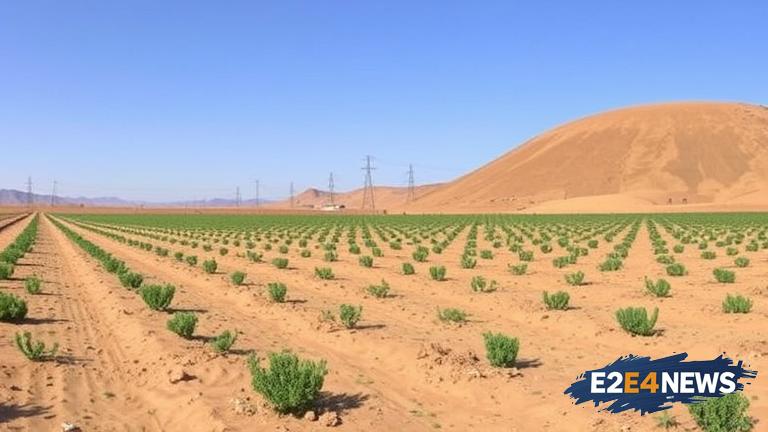Israel has long been a pioneer in agricultural innovation, and its latest endeavors in desert farming are no exception. The country’s agricultural sector has been working tirelessly to develop and implement new techniques to increase crop yields and promote sustainable agriculture in the desert regions. One of the key methods being used is precision agriculture, which involves the use of advanced technology such as drones, satellites, and sensors to monitor and control crop growth. This approach allows farmers to optimize water and fertilizer usage, reducing waste and minimizing the environmental impact of farming. Another technique being employed is hydroponics, a method of growing plants in a nutrient-rich solution rather than soil. This approach has been shown to increase crop yields while using significantly less water than traditional farming methods. Israel’s desert farming initiatives are not only beneficial for the environment, but also provide a significant economic boost to the country. The agricultural sector is a major contributor to Israel’s economy, and the development of new farming techniques is expected to create new job opportunities and stimulate growth. The Israeli government has been actively supporting the development of desert farming, providing funding and resources to farmers and researchers. The country’s Ministry of Agriculture has also established a number of programs and initiatives aimed at promoting sustainable agriculture and reducing the environmental impact of farming. One such program is the ‘Desert Agriculture’ initiative, which provides funding and support to farmers and researchers working on desert farming projects. The initiative has already shown significant results, with many farmers reporting increased crop yields and reduced water usage. In addition to the economic and environmental benefits, Israel’s desert farming initiatives also have the potential to improve food security in the region. The country is already a major exporter of agricultural products, and the development of new farming techniques is expected to increase exports and help to feed growing populations in the Middle East and beyond. Despite the many benefits of desert farming, there are also a number of challenges that must be overcome. One of the main obstacles is the lack of water, which is essential for crop growth. To address this issue, Israeli researchers have been working on the development of new technologies to conserve and efficiently use water. Another challenge is the harsh desert climate, which can be detrimental to crop growth. To overcome this, farmers are using a variety of techniques such as shading and cooling systems to protect their crops. The development of desert farming in Israel is also expected to have a positive impact on the country’s relations with its neighbors. The sharing of knowledge and expertise in agricultural innovation has the potential to bring countries together and promote cooperation and understanding. In recent years, Israel has been working closely with a number of countries in the region, including Jordan and the United Arab Emirates, to promote sustainable agriculture and reduce the environmental impact of farming. The country’s desert farming initiatives have also attracted the attention of international organizations such as the United Nations, which has recognized Israel’s expertise in agricultural innovation. Overall, Israel’s desert farming initiatives are a significant step forward in the development of sustainable agriculture and have the potential to make a major impact on the environment, economy, and food security in the region. The country’s commitment to innovation and its willingness to share knowledge and expertise with its neighbors make it an important player in the global effort to promote sustainable agriculture. As the global population continues to grow, the development of new farming techniques such as those being used in Israel’s desert farming initiatives will be essential to meeting the world’s food needs while minimizing the environmental impact of agriculture. The use of precision agriculture, hydroponics, and other innovative methods has the potential to increase crop yields, reduce waste, and promote sustainable agriculture, making Israel a leader in the field of agricultural innovation. With its strong commitment to research and development, Israel is well-placed to continue to play a major role in the development of sustainable agriculture and to share its expertise with countries around the world.





